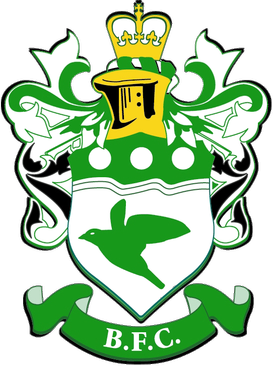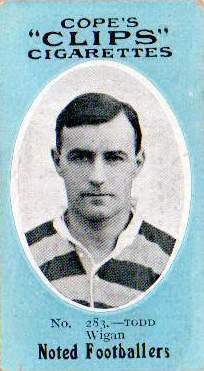
Wigan Borough Football Club was an English football club from the town of Wigan, Lancashire. their forerunners were Wigan A.F.C., Wigan County, Wigan United and Wigan Town, County and Town having folded.

Nelson Football Club is a football club based in Nelson, Lancashire, England. Originally established in 1882, the club played in the Lancashire League, North-East Lancashire Combination, Lancashire Combination and Central League before becoming founding members of the Football League Third Division North in 1921. They were Third Division North champions in 1923 and were promoted to the Second Division. However, they were relegated back to the Third Division North after a single season.

Burscough Football Club is an English football club based in Burscough, Lancashire. The club is a member of the North West Counties League, and competes in the Premier Division. Its home ground is The Community Stadium, in Burscough.

Springfield Park was a multi-purpose stadium in Wigan, Greater Manchester. It was the home ground of Wigan Athletic F.C. until the club moved to the new JJB Stadium after the 1998–99 season. At its largest, the stadium held 40,000. In its 102-year existence the ground only saw 32 years as a Football League venue, 11 years for Wigan Borough F.C. and 21 years for Wigan Athletic FC, before it was demolished to make way for a housing estate in 1999.

Lancelot Beaumont "Lance" Todd was a New Zealand-born rugby league footballer and manager of the early 20th century. As a player, he represented New Zealand in 1907 and 1908 and played in England for the Wigan and Dewsbury clubs. He later became the manager at Salford and led the club to three League Championships and one Challenge Cup victory.
Wigan County F.C. was an association football club based in Wigan, who competed at national level. They were the first football team to play their games at Springfield Park and would be followed by Wigan United, Wigan Town, Wigan Borough and Wigan Athletic.
William Smith, commonly known as Stockport Smith, was an English footballer. His regular position was as an inside right, but he also played in various other forward positions and even as a wing half on occasion. He played for Stockport County, Manchester City, and Newton Heath. He joined Manchester City from Stockport in 1897 and scored 22 goals in 54 league appearances in three years at the club. He is often confused with another William Smith who played for Manchester City at the same time; because of this, they were known to Manchester City fans by the clubs they were signed from; this William Smith is referred to as "Stockport Smith" and the other as "Buxton Smith".
Frederick Augustus Ford Smith was an English footballer who played as a full back in the period prior to World War I.
George Frederick Tyson was an English professional rugby league footballer who played in the 1900s and 1910s. He played at representative level for Great Britain and England, and at club level for Oldham, as a wing.
Tom White was an English rugby union and professional rugby league footballer who played in the 1900s and 1910s. He played representative level rugby union (RU) for Somerset, at armed services level for the Army, and at club level for Bath (captain) and Bristol as a goal-kicking scrum-half or fly-half/outside-half, and representative level rugby league (RL) for Great Britain, England and Lancashire, and at club level for Oldham, as a goal-kicking wing, stand-off, or scrum-half.

James Leytham, also known by the nickname of "Gentleman Jim", was an English professional rugby league footballer who played in the 1890s, 1900s and 1910s. He played at representative level for Great Britain, England and Lancashire, and at club level for Lancaster and Wigan (captain), as a wing.

Thomas Bertie "Bert" Jenkins was a Welsh rugby union, and professional rugby league footballer who played in the 1900s, 1910s and 1920s. He played club level rugby union (RU) for Troedyrhiw RFC and Mountain Ash RFC, and representative level rugby league (RL) for Great Britain, Wales and Lancashire, and at club level for Wigan, as a centre.

Joseph Ferguson was an English professional rugby league footballer who played between 1899 and 1923. He played at representative level for England, Cumberland and Lancashire, and at club level for Oldham, as a fullback, prop, hooker, or second-row.
Wigan United A.F.C. was an association football club existing from around 1896 into the early 1900s, and was based in Wigan, Lancashire, England.
Gateshead Association Football Club was a football club based in Gateshead, County Durham, England. The club was formed in South Shields in 1899 as South Shields Adelaide Athletic. After success in the North Eastern League prior to World War I, they were voted into the Football League in 1919. Financial problems in the late 1920s saw the club relocate to Gateshead in 1930, adopting the name of their new town. They remained in the Football League until 1960, when they were surprisingly voted out of the Football League and replaced by Peterborough United, despite not having had to apply for re-election since 1937. They subsequently played in regional leagues before folding in 1973. In order to replace them, another South Shields club was then moved to Gateshead, becoming Gateshead United.

Thomas Green was an English footballer who played as a winger in the Football League for New Brighton Tower, Liverpool, Middlesbrough and Stockport County.
Jack Barton was an English professional rugby league footballer who played between 1901 and 1910. He played at club level for Wigan as a forward.
Eccles United Football Club, previously known as Eccles Borough and Springfield Athletic, is an English football club based in Eccles, Greater Manchester, England, which participated in the FA Cup and various local leagues. They currently play in the Manchester Football League Division 2
William Biggers, known during his playing career as Billy Biggar, was an English professional footballer who made over 210 appearances as a goalkeeper in the Southern League for Watford. In all competitions for the Hornets, he made 283 appearances and scored two penalties. Earlier in his career, Biggar appeared in the Football League for Sheffield United. He latterly made over 200 appearances in all competitions for non-League club Rochdale. Biggar also acted as trainer at Rochdale and coached at Earlestown.
Joseph Wilson was an English professional footballer who played as a centre half in the Football League for Blackburn Rovers. He also played for Brighton & Hove Albion and Millwall of the Southern League, and played for that league's representative team.








